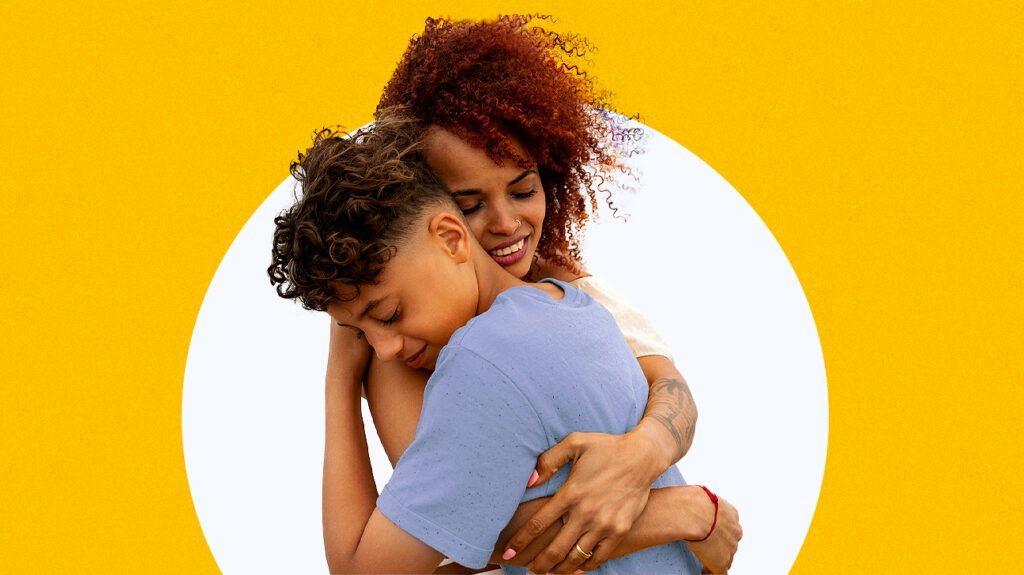
Anxiety and depression have been part of my normal for as long as I can remember. I was a kid when I started struggling, only no one really gave me the words to understand what I was experiencing. Instead, medication was prescribed and everything else was pretended away.
At least, by the adults around me.
Nearly 30 years later, I understand that my parents were doing the best they could with the knowledge they had.
Our parent’s generation lacked the mental illness and mental health awareness that today’s generation of parents has.
But just because there’s less shame surrounding mental health conditions today, and we may be less inclined to hide these issues, doesn’t mean it’s magically easier to speak with kids about mental illness and the importance of mental health.
Whether you want to speak with your kid about mental health in general, about their mental health, yours, or a loved one’s, we know those conversations can be tough. But we also know how important they are. Which is why we want to help you have them in a healthy and productive way.
Mental illness vs. mental health
“Mental illness” is a prevalent term and cannot always be eliminated from our vocabulary. However, mental health professionals and advocates often suggest speaking about “mental health” and “mental health conditions” instead. This switch in wording may be especially helpful for children.
When kids hear the term “illness,” they may link it to the kind of illnesses that cause people to go to the doctor or hospital. This isn’t a bad thing, since mental health conditions are, in fact, illnesses for which people should seek help if they’re able to.
But children may become afraid of the potential outcome of mental illness, especially if they’ve lost a loved one to another health condition.
Therefore, when speaking with your child about mental health, it may be a good idea to try and avoid the term “mental illness” in favor of using “mental health condition.”
The
- chemical imbalances
- genes
- family history
- life experiences
- trauma and life stressors
- substance use
- medical conditions
- relational challenges
Mental health conditions in the United States are common, with roughly
Most mental health conditions fall into one of the following categories as defined in the Diagnostic and Statistical Manual of Mental Disorders, 5th edition (DSM-5):
- Depression and depressive disorders, including:
- major depressive disorder (MDD)
- MDD with seasonal pattern (aka seasonal affective disorder)
- postpartum depression
- Bipolar and related disorders, including:
- Personality disorders, including:
- Anxiety disorders and phobias, including:
- specific phobias
- other types
- Obsessive-compulsive and related disorders, including:
- Substance-related and addictive disorders, including:
- alcohol use disorder
- opioid use disorder
- other types of substance use disorder
- other addictions
- Schizophrenia spectrum and other psychotic disorders, including:
- Trauma and stressor-related disorders, including:
- Feeding and eating disorders, including:
- Neurodevelopmental disorders, including:
- Sleep-wake disorders, including:
- Neurocognitive disorders, including:
- Alzheimer’s
- mild neurocognitive disorder
- major neurocognitive disorder (previously called dementia)
Keep in mind that this is not a comprehensive list. If you want to learn more about the symptoms and qualities of each condition, they’re linked to an article with detailed information.
Many of these conditions can also apply to children. And in nearly all of them, managing and maintaining mental health conditions often requires some sort of outside intervention and treatment.
Given how common many mental health conditions are, it stands to reason there are people in your and your child’s life who fall into the above categories.
But even if mental illness hasn’t touched your child or family personally, having discussions about the importance of mental health and what to do when things become difficult or overwhelming can be part of raising mentally healthy and empathic kids. The kind of kids who are able to relate to and be sources of support for others, as well as those who know how to ask for help themselves when they need it.
It’s best to start simple.
For example, by introducing books, movies, and shows that talk about mental health, how to take care of ourselves, or how to be a good friend in child-friendly ways from a young age. This way, the topic of mental well-being and mental illness never seems too foreign or scary to your kids.
“Finding Dory” can be a great introduction to brain differences and anxiety, for instance. Especially if you talk about those concepts with your child after viewing the film together.
Talking about your own mental health with your kids is another great way to introduce these topics — because we all have moments of high anxiety or sadness, and there’s nothing about that to be ashamed of or hide from.
If you’re having a bad day and your fuse is short or you’re just finding it hard to cope, consider taking a deep breath and sitting down with your kids to share what you’re feeling.
Still, try to keep the conversation developmentally appropriate and avoid dumping your own fears on them.
Instead, consider saying something like, “Mommy/Daddy is feeling a little anxious today.” Then try to explain what that actually feels like — tightness in your chest, heaviness on your shoulders, and worries racing through your mind, for instance.
Then you may wish to ask your child if they’ve ever felt that way themselves and how it looks for them.
And if talking about your own mental health is difficult, or you don’t have any issues to discuss, you can still speak with your child about how you take care of yourself or how you try to be a good friend to someone who may be going through a difficult time.
Kids are bound to have questions when the subject of mental health comes up, especially if they’re personally affected.
Here are some common questions and ways to respond:
Why am I like this?
When talking about mental health conditions with kids, it’s to be expected that they might want to know what causes them.
Answers like genetics and stressful life circumstances will typically suffice for those who are simply curious. But for those who are having a hard time themselves, or who have a loved one with mental health challenges, the question might be more personal — they might want to know why they are impacted by mental illness when others are not.
This may be a good time to talk about any family history of mental health conditions you know of (so that your child feels less alone) and to remind your kiddo that all people have different experiences and challenges, and that mental health conditions are extremely common and treatable.
What is therapy?
With the mention of treatment, kids will probably want to know what that involves. Parents may want to talk about therapy as something everyone can benefit from occasionally, rather than linking it exclusively to mental illness.
This may help remove any potential stigma or shame so that your child is more open to seeking therapy in the future if they need it.
If you want to learn more about talking to your kid about what therapy looks like, we’ve got a great child-friendly guide to therapy that may help.
Can people die from mental illness?
As mentioned above, children have very literal brains, so when they hear the term “illness,” they may automatically link it to the kind of illnesses that can land people in doctor’s offices or the hospital. Which is good!
Remembering that mental health conditions are, in fact, medical conditions and not signs of weakness is an important part of reducing stigma.
But they may also be afraid of what the potential outcome of mental illness is. And if a child has lost a loved one to suicide, or experienced thoughts of suicide themselves, they may fear all mental illnesses could lead to similar results.
This is obviously a sensitive subject — and one that should be approached carefully. But the best answer may be to remind your child that mental health conditions can be treated, and that seeing a doctor, therapist, or psychiatrist can help.
If you’re looking for resources to assist in talking to your child about mental health, the National Alliance on Mental Illness (NAMI) is a great place to start.
The Child Welfare Information Gateway further provides a list of resources that can help in specific situations.
And books like “I’m Sick” by Taylor Nicole, “Wishing Wellness” by Lisa Anne Clarke, or “Mama’s Waves” and “Daddy’s Waves” by Chandra Ghosh Ippen, can be especially helpful for parents of young children who are dealing with mental illness themselves as they discuss mental health with their kids.
Book resources for older kids and teens are also available, ranging from self-help books like “Anxiety Relief for Teens” by Regine Galanti to youth novels like “Mosquitoland” by David Arnold or “Challenger Deep” by Neal Shusterman.
In fact, there are countless books about mental health (from those that focus on breathing techniques to those that talk about loss and fear) for kids and teens.
We’ve even compiled our own list of our favorite books about anxiety for kids and their parents to read together, if you’re looking for further suggestions. Or you can ask for recommendations from friends, mental health professionals, or mental health support groups.
It’s important to keep in mind that a single discussion doesn’t usually cover the topic of mental health and mental illness.
By remaining open and continuing the conversation as your child grows, you can help them recognize and understand that mental health conditions are nothing to be ashamed of and that help is always available.
But if you find your discussions lead to more questions than answers, or if your child has fears or concerns surrounding mental health that aren’t going away, enlisting the help of a professional can be a great idea.
Your pediatrician is a perfect place to start, as they can likely recommend pediatric mental health professionals in your area.
The following section is intended to be read to or with your kid to help them better understand mental health and mental illness.
Kids’ corner: What are mental health conditions?
When you look at your very best friends, what do you see? Their eyes, their ears, their noses, and the clothes they picked out that day?
Do they look exactly like you, or do they have differences that make them who they are?
Unless your best friend is your identical twin, they probably have a lot of differences that you can see. And even if they are your twin, there are always differences you cannot see. Things like games you like to play, shows you like to watch, or interesting subjects you like to learn about.
We’re all different in our own ways, and our brains are different too. Our thoughts and feelings are our own, as unique to us as our fingerprints.
Sometimes our brains get sick. Just like a cough or a cold that our body has trouble fighting, our brain might start having thoughts we don’t want to have and do not really understand, like feeling angry or mad, or worried or sad.
When this happens, it’s called a mental health condition. And just like any other type of sickness, there are special doctors and treatments that can help.
But we have to talk about it first. We have to tell people that our brains aren’t working like they should.
If you ever find yourself worrying about lots of things, or feeling sad lots of the time, even when nothing bad has happened, telling your mom or dad, or somebody else who takes care of you, can help.
Our brains get sick for lots of reasons. Sometimes after something bad or scary happens in our lives, and sometimes just because. But it’s nothing to be embarrassed about, and it happens to lots of people.
It might even happen to someone in your family or your best friend. That doesn’t mean they’re going to die. Doctors can help them, too, if they ask for help.
So don’t be afraid if you or someone you know has a mental health condition. Talk to an adult you trust, and they can help you understand what is happening and get you help if you need it.
Leah Campbell is a writer and editor living in Anchorage, Alaska. A single mother by choice, Leah is an adoptive and foster mom to four biological siblings who spent way too much of their life apart. She’s the author of the books “Single Infertile Female” and “The Story of My Open Adoption” and has written extensively on the topics of mental health, adoption, and parenting. You can connect with Leah via Facebook, her website, and Twitter.


